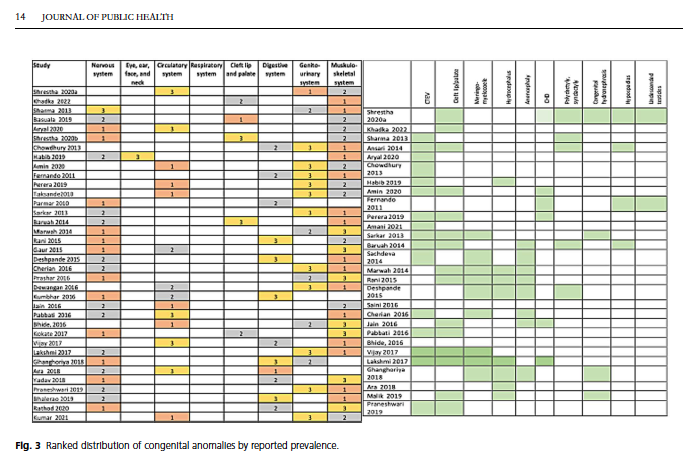
The group of doctoral & research students (From right to Left: Supriya, Amruta, Prajkta, Dr. Kar, Pooja, Kalyani, Charuta, Sumedha & Shweta)
Birth Defects Research Foundation, Pune is a continuation of the two-and-a-half-decade-long work initiated at the School of Health Sciences, Savitribai Phule Pune University, Pune India.
Our research focuses on understanding the epidemiology and public health implications of birth defects in India, with the goal of suggesting components for a low-cost, contextual, people-centric and ethical birth defects service. When the research initiated in 2000, there was low public health interest in these conditions, as they were considered to be rare and too debilitating to constitute a public health problem. In 2013 the Rashtriya Bal Swasthya Karyakram was launched, which included screening and early intervention for selected birth defects and developmental disabilities. Despite the RBSK, services are insufficient, and the distress of parents remains invisible.




Our Research
Our research focuses on birth defects (congenital disorders), examining their epidemiology and public health implications1. The research has focused on understanding the elements of a situationally appropriate, equitable, and sustainable model of care for birth defects in low and low-middle income settings.
Our research has examined the magnitude of disorders. We have conducted systematic reviews and meta-analyses to estimate the birth prevalence of congenital anomalies in India2, the magnitude of neural tube defects3 and the prevalence of beta-thalassemia carriers in India4. Our cohort study identified that the 2.3% birth prevalence of congenital anomalies was not dissimilar from that reported globally5. We have used modelled estimates from the Global Burden of Disease data to report an increase in the proportion of child mortality attributable to birth defects6. Our research has discussed birth defects surveillance and reporting systems in India7.
We have developed a checklist to minimize bias in the design and reporting of studies reporting the birth prevalence of congenital anomalies in India8. Our past and current research examines the potential of the Rashtriya Bal Swasthya Karyakram as a sustainable model for providing birth defects screening, diagnosis and management for congenital disorders and disabilities in India9. We have examined maternal health issues related to birth defects, reporting preconception risk factors10, prevalence of folate insufficiency11, and women’s knowledge about birth defects12. We have recently reported the history of thalidomide in India13.
Our earlier work focused on the epidemiology and social consequences of a prevalent genetic disorder, hemophilia14. In addition to quantitative and qualitative methods, we have utilized molecular techniques in our studies15. Being closely associated with public health education and doctoral research, we have developed a Birth Defects Toolkit to introduce students without a clinical background to these disorders and their public health implications16.
Selected Publications
1. Kar, A. (2021). Birth Defects: A Public Health Approach. In Birth Defects in India 3-29; Springer, Singapore 2021
2. Bhide P and Kar A (2018) : A national estimate of the birth prevalence of congenital anomalies in India: systematic review and meta-analysis BMC Pediatrics 18:175 https://doi.org/10.1186/s12887-018-1149-0
3. Bhide, P., Sagoo, G. S., Moorthie, S., Burton, H. and Kar, A. (2013), Systematic review of birth prevalence of neural tube defects in India. Birth Defects Research Part A:Clinical and Molecular Teratology, 97: 437–443. doi: 10.1002/bdra.23153
4. Dharmarajan, S, & Kar, A. (2023). Prevalence of beta thalassemia carriers in India: a systematic review and meta-analysis. Journal of Community Genetics, 14(6), 527-541.
5. Bhide P, Gund P and Kar A (2016): Prevalence of Congenital Anomalies in an Indian Maternal Cohort:Healthcare, Prevention, and Surveillance Implications PLoS ONE11(11): e0166408.doi:10.1371/journal.pone.0166408
6. Ujagare D and Kar A (2021) Birth Defect Mortality in India 1990-2017: Estimates from the Global Burden of Disease Data. Journal of Community Genetics 12, 81-90
7. Kar A. Birth defects reporting and surveillance in India: a narrative review. J Community Genet. 2024 Dec 9. doi: 10.1007/s12687-024-00760-5. Epub ahead of print. PMID: 39652147.
8. Dharmarajan, S., Bhide, P., & Kar, A. (2024). Sources of bias in studies reporting birth prevalence of congenital anomalies: a scoping review and reporting checklist. Journal of Public Health, fdae299.
9. Kar A, Radhakrishnan B, Girase T, Ujagare D, Patil A. Community based screening and early intervention for birth defects and developmental disabilities: Lessons from the RBSK programme in India Disability, CBR & Inclusive Development 31(1) 30-46
10. Gund P, Bhide P, Kar A. (2016) Prevalence of Periconception Risk Factors for Adverse Pregnancy Outcomes in a Cohort of Urban Indian Women: Implications for Preconception Health Education. J Women’s Health Care. 2016;5: 296. doi:10.4172/2167-0420.1000296.
11. Bhide P and Kar A (2018) Prevalence and determinants of folate deficiency among urban Indian women in the periconception period Eur J Clin Nutr (DOI: 10.1038/s41430-018-0255-2)
12. Kar, A., Dhamdhere, D., & Medhekar, A. (2023). “Fruits of our past karma”: a qualitative study on knowledge and attitudes about congenital anomalies among women in Pune district, India. Journal of Community Genetics, 3; 1-10.
13. Wimmelbücker L and Kar A.(2022) History of thalidomide in India. Medical History 67(3),228-246
14. Kar A, Phadnis S, Dharmarajan S, Nakade J. (2014) :Epidemiology and social costs of haemophilia in India. Ind.J.Medical Res. 140, 19-31
15. Dharmarajan S, Kar A Undiagnosed haemoglobinopathies among pregnant women attending antenatal care clinics in Pune, India J Community Genet (2021). https://doi.org/10.1007/s12687-021-00505-8)
16. A Birth Defects Toolkit for public health students and community health practitioners in India (in press)
Projects Ongoing and Completed
1. Population prevalence of congenital disorders and disabilities among children under 5 in a rural area in Pune district, India

Status: Completed
Public health interventions for a birth defects service for low and low-middle income countries: Implications from a community study in India [ms submitted]
2. A scoping review of risk of bias in studies on birth prevalence of congenital anomalies from countries of Southeast Asia

Status: Completed
Dharmarajan S, Bhide P, & Kar A. (2024). Sources of bias in studies reporting birth prevalence of congenital anomalies: a scoping review and reporting checklist. Journal of Public Health, fdae299.
A Birth Defects Toolkit for public health students and community health practitioners in India

Status: Completed
(A Birth Defects Toolkit for public health students and community health practitioners in India [in press])
Our Team

Dr. Anita Kar
Founder - DirectorTrained in the field of human genetics, public health and epidemiology, her research in the field of birth defects initiated at the School of Health Sciences of Pune University, India, where she was the Professor and Director for many years. In addition to her interest in understanding the epidemiology, public health implications and the development of a public health model for birth defects, Dr Kar was responsible for developing the first University Grants Commission approved Master of Public Health programme in the country. She has developed the global health field course that is being offered from the School to students from across the world.
Download CV
Prof. J.K. Pal
Prof. J.K. Pal, Ph.D., FNASc., former Professor & Head, Department of Biotechnology, Savitribai Phule Pune University,former Director, Dr. D.Y. Patil Biotechnology & Bioinformatics Institute, Dr. D.Y. Patil Vidyapeeth. He brings his expertise in a book project on the cellular, molecular and developmental basis of congenital anomalies.

Prof. Pramod Khandekar
AdvocacyProf. Pramod Khandekar retired as Professor of Biotechnology from Pune University. He brings his skills as a science communicator, together with health and wellness education including yogasana to the Birth Defects Centres activities.

Bhagyashree Radhakrishnan
Research Associate & Manager, Doctoral StudentBhagyashree has a Masters degree in Health Sciences and is the Research Associate and Manager of the NGO. Her research has focussed on uptake of medical services and compliance to rehabilitation advice by caregivers of children with birth defects and developmental disabilities diagnosed by the RBSK service. Additionally, she has experience in the field of journal publishing.

Dr. Sumedha Dharmarajan
Research AffiliateDr. Sumedha Dharmarajan is an expert in epidemiology and human genetics. She combines laboratory, epidemiological and data analytical skills to investigate congenital disorders.

Aishwarya Medhekar MPH
Advocacy, Content DeveloperAishwarya is a public health researcher with a background in genetics and molecular biology. She has been associated with the Centre since its inception as an intern where she was responsible for collating the data for the Parents Information Kiosk. As a researcher, she conducted a qualitative study on knowledge on congenital anomalies among urban women. She is an active volunteer, engaged in disseminating data on birth defects among stakeholders.